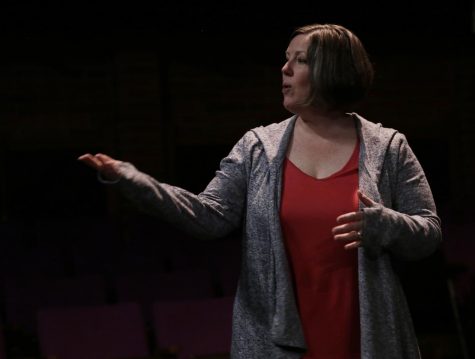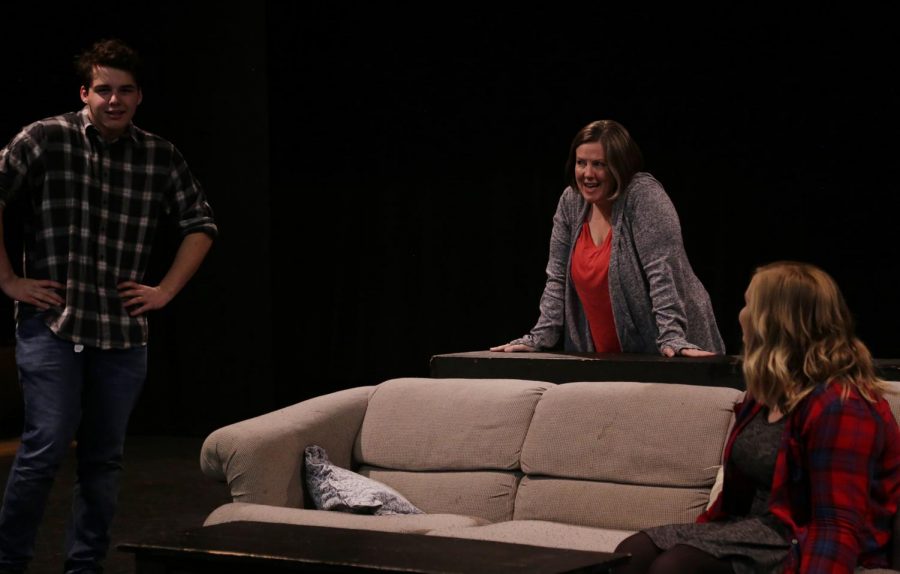Performing Arts cut hits home
Founding faculty will see their program, positions end after semester
RYAN PUGH | The Daily Evergreen
Performing Arts professor Mary Trotter, center, goes over how Jayden Berglund, left, and Gabrielle Clegg can improve upon their scene Tuesday in Wadleigh Theatre.
November 15, 2017
Mary Trotter sat at home with her two-year-old twin daughters Sophia and Josephine on her lap on the morning of Nov. 2, thinking over the events that would unfold that evening.
Trotter, a faculty senator, clinical assistant professor in the College of Arts and Sciences and Performing Arts support staff, would criticize WSU administration in front of the Faculty Senate that night. Although she was terrified, Trotter did not second-guess her decision to stand up for what she believes and to teach her daughters the same.
“If you are unhappy about things that are happening, you should use your voice and let it be known,” Trotter said. “If we see something we don’t like, we have to stand up.”
About a week earlier, Trotter and three other Performing Arts faculty and staff sat down to meet with the Dean of the College of Arts and Sciences, Daryll Dewald, at about 1:30 p.m., where they found out their department would no longer be funded by the university.
Less than four hours later, on Oct. 24, students and staff received a university-wide email from WSU President Kirk Schulz announcing that in order to reduce the university’s $30-million deficit, they would be cutting programs.
Performing Arts was first on the chopping block, due to non-permanent funding, Schulz wrote. The program has spent over $1.6 million since its inception in 2011, or about $228,570 annually.
“Unfortunately,” Schulz wrote in the email, “this means that positions will be eliminated when the Performing Arts program is ended at the close of this performance season.”

Mary Trotter instructs students Tuesday afternoon in Wadleigh Theatre.
From the ground up
Trotter is one of four faculty directly affected by the program’s elimination. She teaches Introduction to Acting, which has been housed under the music department since late WSU President Elson S. Floyd cut the Department of Theater and Dance in 2008.
She was recruited to help form Performing Arts from the ground up in 2011, along with Director Gail Siegel, and Trotter’s then-boyfriend Benjamin Gonzales, who was carried over from the Department of Theater and Dance with facility operations coordinator Jon Carlson.
“When the Department of Theater and Dance was cut, Elson Floyd decided to create something to fill the void,” Trotter said. “That is when four of us … were brought together to create WSU Performing Arts.”
While Siegel and Carlson work to bring outside performers to campus, Trotter and Gonzales work on fully-produced shows, or productions that students in the community can audition for and perform in. In the past, the couple has worked on “Las Memorias” and the “Performance Project,” shows that allow students to write and perform their own story.
“Watching people find themselves, discover this power that they actually have through performance and telling their story,” Trotter said, “that’s exactly what those programs are aimed at.”
Trotter and Gonzales advise the student theater group STAGE, a registered student organization that uses the theaters and spaces provided by Performing Arts. Trotter said the day the department elimination was announced, her students were angry and asked her questions for which she still does not have answers, like what will happen to the theaters and who will be in control of the facilities’ operations.
Sophomore broadcast production major Lauren Prasanna, who is enrolled in Trotter’s Introduction to Acting course, said coming into class the day after the announcement, her classmates looked hurt and defeated, but Trotter sent a different message.
“I was so surprised, she was just very like, ‘It’s not about me, it’s about you and your education,’ ” Prasanna said, “and she really encouraged us to speak to the president and give our opinions about what’s going on.”
While Trotter told her students to fight for the experience they want from WSU, she admitted that the announcement has had a direct impact on the environment within the department. She said people do not feel secure in their jobs.
“A lot of people are just waiting for the next shoe to drop,” she said. “That doesn’t foster a very healthy working environment.”
In defense of the arts
Trotter met her now-husband Gonzales as she was studying to earn her Master of Fine Arts in theater at the University of Idaho in 2004. Gonzales was a teaching assistant at WSU and studied theater at the undergraduate level.
As one of two carry-over faculty from the Department of Theater and Dance, Gonzales said five years of his professional career have been in defense of arts and theater. Trotter agreed that sometimes, the arts struggle to prove their worth, though she said they shouldn’t have to.
“I was shocked, but not shocked at the same time,” she said of the program’s elimination.
While some have made the argument that Performing Arts may have survived the cuts if the staff and students had fundraised for the program, Trotter said they were never given that opportunity or option. Programmatically, Performing Arts is self-sustaining, but that does not include the salaries of full-time staff or the cost of facility operations, which administrators said have come out of university reserves for the past seven years.
“This idea that every unit or every area at a university should be self-funding is just odd to me,” Trotter said. “When you look at Multicultural Student Services, a unit that provides endless amounts of support for our students, are they supposed to go raise money to exist?”
While Gonzales stayed at WSU despite his department’s elimination in 2008, he said there will be more students and faculty affected by the end of Performing Arts this time around. He and Trotter collectively teach over 250 students and the theaters host more than 13,000 visitors per year, he said.
“The little investment that the university puts into the performing arts, they’re getting a huge return on it,” Gonzales said.
Trotter said she does not feel that the arts are supported at WSU, and Prasanna agrees.
“WSU really doesn’t care about this kind of stuff,” Prasanna said, “and they shouldn’t disguise it as anything else because the programs really don’t use that much money.”
As a theater artist, Trotter said, it is her job to have empathy for other people, and she does not envy the decisions that administrators have to make when facing a budget deficit like this. But she does believe that the WSU community deserves more transparency about university spending reductions.
Trotter said it is important to involve the people affected in the conversation to decide what is most important to sustain.
“There’s been a lot of confusion about how things are decided,” she said, “and we don’t really have that information either.”
‘We’ll get there’
For Trotter, having two-year-old daughters means that she will do what she must to provide for her family and find a paycheck, she said. Trotter said she is facing an uncertain future, a lot of job applications and a potential relocation.
“When both parents are all of a sudden on the job market,” Gonzales said, “you go ‘Well, things are going to change drastically,’ especially in a place like Pullman.”
Gonzales said he believes he and Trotter are marketable due to their service in the region, their work with student groups and projects, and the connections they’ve made over the years.
“The good news for it all is that we’re both still relatively young and in our primes when it comes to doing what we do,” he said.
The couple’s shared passion for theater and performing arts overflows into their lives outside of work. Gonzales said that it is both their profession and hobby, and they know that theater is what they will do for the rest of their careers.
“We’re open to any possibilities and we’ll get there,” Trotter said. “We’ll just continue to do the work. We’ll find another place to do the work.”
Trotter said theater has helped her gain self-confidence and learn the importance of collaboration, which is something she hopes to pass on to her students and daughters.
“Theater has taught me that I have a voice,” Trotter said, “and that it matters just as much as anyone else’s.”
Correction: This article has been updated to reflect the correct spelling of Benjamin Gonzales.









